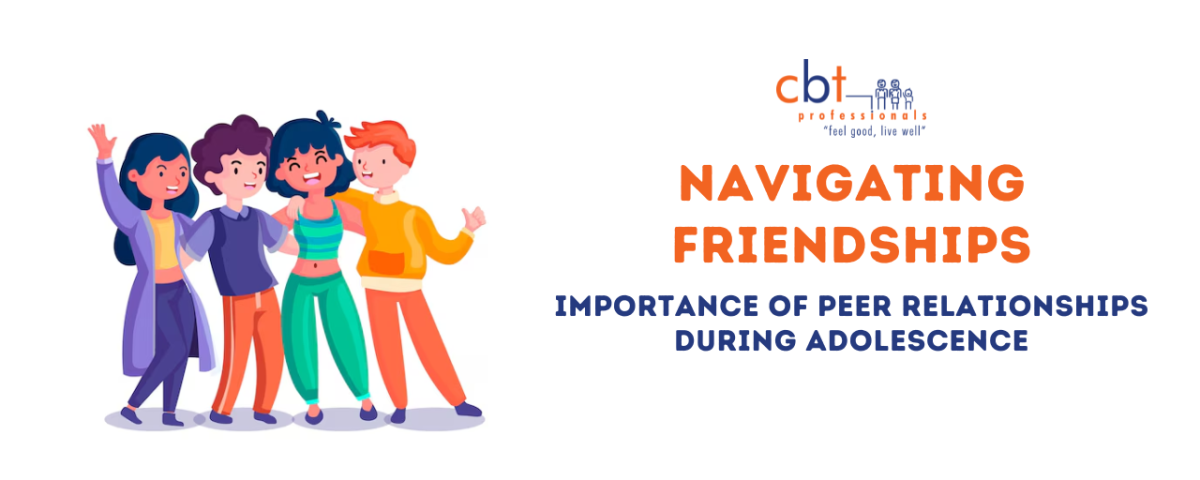The Importance of Peer Relationships During Adolescence: Navigating Friendships
During adolescence, peer relationships play a crucial role in shaping an individual’s development and overall well-being. This pivotal phase is marked by a heightened focus on social interactions, peer acceptance, and the formation of friendships that significantly influence emotional growth and identity development. Understanding the dynamics of peer relationships, including peer pressure, social dynamics, and communication skills, is essential for navigating friendships effectively during this transformative period.
Peer Relationships and Identity Development
Adolescence is a time of exploration and self-discovery, and peer relationships serve as a primary platform for this journey. Friends provide a sense of belonging and acceptance, which is vital for developing a positive self-image. The desire to be liked and accepted by peers can influence behaviours, values, and beliefs, contributing to the formation of identity. As adolescents navigate different social groups, they experiment with various roles and identities, ultimately shaping their sense of self.
Peer Pressure: Balancing Influence and Autonomy
Peer pressure is a common aspect of adolescent friendships, characterised by the influence peers have on each other’s behaviours and decisions. While peer pressure can sometimes lead to risky behaviours or conformity, it can also promote positive outcomes such as academic motivation, healthy lifestyle choices, and prosocial behaviour. Understanding how to navigate peer pressure involves striking a balance between fitting in with peers and maintaining individual autonomy and personal values.
Social Dynamics: Negotiating Complex Relationships
Adolescents experience a range of social dynamics within peer groups, including hierarchies, cliques, and shifting alliances. These dynamics can influence friendship formation and maintenance. Adolescents often strive to find their place within these social structures while learning to navigate challenges such as exclusion, jealousy, and conflicts. Developing social intelligence and empathy is essential for understanding these dynamics and fostering healthy relationships.
Healthy Communication Skills: Building Strong Connections
Effective communication is the cornerstone of healthy friendships. Adolescents must learn to express themselves, listen actively, and resolve conflicts constructively. Clear communication fosters trust, empathy, and mutual respect among friends. Teaching adolescents’ assertiveness skills empower them to express their needs and boundaries confidently, enhancing the quality of their relationships.
Navigating Friendships: Tips for Adolescents
- Be Authentic: Embrace your true self and seek friendships with people who accept you for who you are.
- Develop Empathy: Try to understand others’ perspectives and feelings to build deeper connections.
- Set Boundaries: Learn to say ‘no’ when needed and respect others’ boundaries.
- Choose Wisely: Surround yourself with friends who positively influence you and share similar values.
- Communicate Openly: Express yourself honestly and listen actively to your friends’ concerns.
Supporting Adolescents in Building Healthy Friendships
Parents, educators, and caregivers play vital roles in supporting adolescents’ social development:
- Encourage Open Communication: Create a safe environment for adolescents to discuss their friendships and concerns.
- Model Healthy Relationships: Demonstrate positive communication and conflict resolution skills in your own relationships.
- Provide Guidance: Offer advice on navigating peer pressure and building meaningful connections based on mutual respect.
- Promote Extracurricular Activities: Encourage participation in activities that facilitate social interactions and the development of new friendships.
Navigating friendships during adolescence is a dynamic process that significantly contributes to emotional growth and identity development. By understanding the importance of peer relationships, recognising the impact of peer pressure, embracing healthy communication skills, and providing support and guidance, adolescents can cultivate fulfilling and supportive friendships that contribute positively to their overall well-being. As adolescents navigate this complex terrain, they develop essential social and emotional competencies that lay the foundation for healthy relationships throughout life.
Are you or someone you know navigating the complexities of adolescent friendships and peer relationships?
At CBT Professionals, we understand the importance of fostering healthy social interactions during this transformative phase of life.
Our team of experienced psychologists specialises in providing evidence-based cognitive-behavioural therapy (CBT) services tailored to adolescents. We offer support in addressing challenges such as:
- Peer Pressure: Learning to navigate peer influence while maintaining autonomy and personal values.
- Social Dynamics: Understanding and managing complex relationship dynamics within peer groups.
- Communication Skills: Developing effective communication strategies to build and sustain meaningful friendships.
If you or a loved one could benefit from professional guidance in navigating adolescent friendships, don’t hesitate to reach out to us. Our services are designed to empower adolescents with the skills they need to cultivate positive relationships and thrive during this important stage of development.
To learn more about our psychology services for adolescents, please visit contact us directly at:
Coomera – (07) 5551 0251
Nerang – (07) 5668 3490
Mount Gravatt – (07) 3102 1366
If you, or someone you know, require help, please reach out to organisations like Beyond Blue.
Additionally reach out to these organisations that may be able to help.
- ReachOut (youth mental health service) — online help
- SANE Australia — call 1800 187 263
- Mental Illness Fellowship of Australia (MIFA) — call 1800 985 944
- LifeLine 13 11 14 — for anyone in crisis
(Health Direct, 2020).
If this is an emergency, please contact 000 or visit your local emergency department.
Disclaimer: Content on this website is provided for education and information purposes only and is not intended to replace advise from your doctor or registered health professional. Readers are urged to consult their registered practitioner for diagnosis and treatment for their medical concerns.
THREE CONVENIENT LOCATIONS
MOUNT GRAVATT
Mt Gravatt Medical PrecinctSE 105, 1808 Logan Rd
Upper Mount Gravatt QLD 4122


